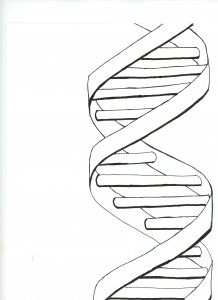Current genetic screening process fails to deliver useful, accurate results

Scientia potentia est,” or “knowledge is power,” is a phrase that has recently held new meaning in the world of medicine. The first human genetic map was created in 1987. The process of mapping human genes and screening for specific illnesses is an even newer concept.
Genetic testing provides a way for people to see potential “changes in chromosomes, genes or proteins,” according to Genetics Home Reference, a service of the U.S. National Library of Medicine. “The results of a genetic test can confirm or rule out a suspected genetic condition or help determinea person’s chance of developing or passing on a genetic disorder,” the website states.
There are multiple types of genetic testing available. Diagnostic testing is used to identify which disease is making someone ill, according to the National Human Genome Research Institute. Predictive and pre-symptomatic genetic tests “find gene changes that increase a person’s likelihood of developing diseases,” according to the NHGRI. Carrier testing reveals people who are carriers of a disease, meaning they can pass it on, but may never show symptoms or signs of having it themselves.
Prenatal testing is used to detect whether a fetus has certain diseases, while newborn screening is used to detect potential health issues in babies who are only a few days old, according to the NHGRI.
These five types of testing are the most common, but there are more than 1,000 genetic tests available, according to GHR.
Genetic testing can reveal positive or negative results on a wide range of illnesses, including many different types of cancer, according to the NHGRI. It can also determine which genes may later contribute to the risk of developing a disease, which genes could be handed down to children, whether a current disease resulted from a genetic change, and the best medications to treat an illness.
While these tests have been available to the public for a while, they have recently been in the news following Angelina Jolie’s highly publicized decisions to first have a double mastectomy and then have her ovaries and fallopian tubes removed after doctors discovered certain mutations in her genes. After Jolie revealed her decisions, there was a “surge in demand for genetic testing,” according to an article for Reuters. “Medical researchers call
it the ‘Angelina Effect,’” the article stated.
People are requesting genetic testing in greater numbers, but there are some potential drawbacks as well, according to Reuters. The tests are not precise and could potentially give false negatives or false positives or could indicate to a person that they could develop a disease, while they may never get it. Most insurance companies do not want to pay for the broad tests, and without insurance coverage, the tests can cost up to $4,900.
Individuals should still get their regular checkups, even if test results are positive for gene changes. Some see the test results as final and conclusive, but that is not how the tests work. Individuals may not ever suffer from the illness they tested “positive” for. And, if the test was negative, that does not mean they will never contract the disease.
At present, the genetic testing available is not accurate enough to warrant spending the money required and putting one’s mental health at risk just to find out if he or she might have a gene that might cause a disease.
If someone tests positive, what’s next?
There is really nothing that can be done until the disease has actually developed.
Individuals should still go to the doctor, get checkups and face the sickness when and if it arises.
Genetic testing is a great medical research tool, but the technology is not at a place where
people can get tested and act-
ually do something about it.
The results could cause a
person to question every little bump and scrape.
That is not a healthy way to live, nor is it productive. Science should keep its genetic testing for now and focus on making a genetic test that does not sound like a visit to a free psychic at the town carnival.






